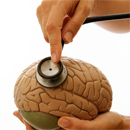 Whether you believe it or not, your mental health affects you every day of your life. Your mental health impacts your life in so many ways; it even has an impact on your physical health and performance. If you don’t have a healthy mind, you won’t have a healthy body. Everyone has days where they feel sad or stressed, but most of the time, these feeling pass. Your mental health does not remain the same throughout your life; it changes with different life events. Eating right and exercising are important steps to take in order to maintain your brain and body performance.
Whether you believe it or not, your mental health affects you every day of your life. Your mental health impacts your life in so many ways; it even has an impact on your physical health and performance. If you don’t have a healthy mind, you won’t have a healthy body. Everyone has days where they feel sad or stressed, but most of the time, these feeling pass. Your mental health does not remain the same throughout your life; it changes with different life events. Eating right and exercising are important steps to take in order to maintain your brain and body performance.
What is “good” mental health?
The definition of good mental health is not absolute. The Canadian Mental Health Association suggestions that you should evaluate your own mental health by looking at the following characteristics:
Advertisement
1. Ability to enjoy life – can you appreciate what’s going on in your life right now?
2. Resilience – do you have the ability to bounce back when things aren’t going well?
3. Balance – are you able to handle everything that’s going on in your life? Do you have a good work/life balance? Are you able to make changes if needed to restore balance?
4. Self-actualization – are you able to identify and use your strengths to maximize your performance?
5. Flexibility – are you able to adapt to changes and change your expectations if needed?
By asking yourself the above questions, you will be able to identify if your mental health is good or if you need to make changes in order to improve it. Improvements made to your brain health will lead to better performance of your brain and body.
In addition to healthy eating, physical activity as well as stress control will help you to maintain your mental health and improve your brain performance.
Nutrition and Mental Health
The food that you put into your body has a direct impact on your energy levels, your physical performance and your mood. The food that you eat supplies your body with the nutrients and vitamins that it needs for survival and for proper brain performance. Incorporate the following foods into your diet for improved brain performance:
– Fresh fruits and vegetables
– Whole grains
– Protein
– Foods high in omega-3 fatty acids (seeds, nuts, fish and eggs)
Nutrition and Depression
Depression is a mental health problem where a person experiences feelings of worthlessness, helplessness or hopelessness. Many people that suffer from depression also have sleep disturbances as well as changes in appetite. People who have depression often have difficulty concentrating and making decisions. Losing interest in activities that an individual used to enjoy is also a symptom of depression. Decreased sex drive as well as feeling overly tired can also signal depression. People with extreme cases of depression may even have thoughts of death or suicide.
No research has shown that a specific diet can treat depression. However, a healthy diet may support a complete treatment plan for depression. If you are suffering from depression, following the diet below may help in addition to other treatment that you are receiving.
– Eat a diet rich in nutrients – including vitamins, minerals, carbohydrates, protein and a small amount of fat
– Add in foods containing antioxidants – your brain is susceptible to damage from free radicals. Antioxidants protect your brain from this damage. Many fruits and vegetables as well as nuts, seeds and vegetable oil are sources of antioxidants.
– Eat a protein rich diet – turkey, tuna and chicken all contain tyrosine which is an amino acid that helps boost dopamine and norepinephrine levels in the brain. This boost helps you to concentrate and be more alert.
– Follow a Mediterranean diet – this diet includes plenty of fruits and veggies, nuts, cereals, legumes and fish. This diet is high in folate and Vitamin B12.
– Add in selenium rich foods – adding beans, legumes, lean mean, low fat dairy, nuts, seed, grains and seafood with provide you with selenium which is essential to good health.
– Be sure to include omega-3 fatty acids – a deficiency of omega-3 has been found in those suffering from depression. Try adding fatty fish, nuts and flaxseed into your diet.
Advertisement
Following some of the diet recommendations, in addition to traditional medical treatment for depression will help to ease some of the symptoms of depression. Even if you don’t suffer from depression, following the above diet recommendations may have a positive impact on your brain health.
What is quite interesting is that some experts are starting to look at whether a lack of certain nutrients, including: folate, Vitamin B12, calcium, iron, selenium, zinc and omega-3 may have an impact on mothers that are suffering from postpartum depression. The addition of these nutrients into the diets of new mothers may help to prevent postpartum depression.
It is important to take care of your mental health through diet, as well as exercise and stress management. Having good mental health will allow you to enjoy the little things in life.
